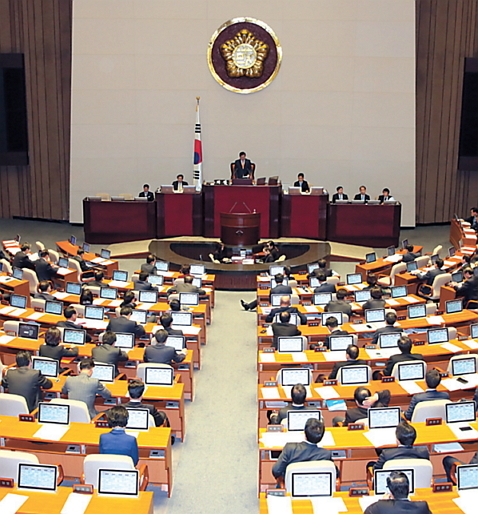[Newsmaker] Assembly to vote on anticorruption bill
By Korea HeraldPublished : Jan. 11, 2015 - 21:59
The National Assembly is set to enact what will be the nation’s toughest-ever law against corruption, which has been held back by political bickering and vested interests for nearly four years.
The so-called Kim Young-ran bill was passed by a parliamentary subcommittee last week and is expected to be put to a final vote at a plenary session next month.
Under the new law, which will take effect in January 2016, public servants and their families will be punished when they receive 1 million won ($910) or more in cash or equivalent gifts, even as birthday or Christmas presents.
The bill was named after the former Supreme Court justice and chairwoman of the Anti-corruption and Civil Rights Commission who first proposed it in June 2011.
Kim’s initial bill failed to pass the Assembly. The incumbent Park Geun-hye administration submitted a revised package in August 2013 under the same name.
The so-called Kim Young-ran bill was passed by a parliamentary subcommittee last week and is expected to be put to a final vote at a plenary session next month.
Under the new law, which will take effect in January 2016, public servants and their families will be punished when they receive 1 million won ($910) or more in cash or equivalent gifts, even as birthday or Christmas presents.
The bill was named after the former Supreme Court justice and chairwoman of the Anti-corruption and Civil Rights Commission who first proposed it in June 2011.
Kim’s initial bill failed to pass the Assembly. The incumbent Park Geun-hye administration submitted a revised package in August 2013 under the same name.

Public support for the bill has been high, especially in the weeks following the Sewol ferry accident in April last year that killed more than 300, most of them high school students.
Investigation found that maritime regulators had chronically condoned safety violations of private industry officials in return for kickbacks, or “special treatment.”
But lawmakers have dragged their feet over legislating the bill, wrangling over details such as whether nonpublic servants would be included, or what sum could be considered a bribe.
The bill, as passed by the National Policy Subcommittee last week, will include nongovernment public interest groups such as members of the media and teachers at private schools as those subject to bribery penalties.
Officials caught receiving bribes of less than 1 million won will be fined.
The bill defines monetary gifts as “all deposits, products or services that can be considered monetary in nature.” It also gives special exceptions to those giving financial gifts to public institutions in the form of donations that will be used for public purposes.
Due to the comprehensive nature of the bill, up to 20 million people or about 40 percent of the nation could be affected.
The bill also intends to make it easier for courts to punish bureaucrats suspected of receiving illicit money.
According to current laws, prosecutors must prove that a suspected official received monetary gifts for a specific purpose. The bill will allow courts to incriminate officials if they receive money from interest groups, even if the money was not taken for any specific objective.
The original version of the bill had proposed stricter measures, suggesting that all public officials receiving money, regardless of the amount, should be punished.
The main opposition New Politics Alliance for Democracy initially supported the original version but agreed to set the bar at 1 million won, after the governing Saenuri Party asserted the bill would have unwanted side effects, such as the punishment of those giving innocent low-cost gifts.
In the Corruption Perceptions Index released by Transparency International last year, Korea ranked No. 43 among 175 countries surveyed and No. 27 among the 34 members of the Organization of Economic Cooperation and Development.
By Jeong Hunny (hj257@heraldcorp.com)
-
Articles by Korea Herald


![[Exclusive] Korean military set to ban iPhones over 'security' concerns](http://res.heraldm.com/phpwas/restmb_idxmake.php?idx=644&simg=/content/image/2024/04/23/20240423050599_0.jpg&u=20240423183955)




![[Pressure points] Leggings in public: Fashion statement or social faux pas?](http://res.heraldm.com/phpwas/restmb_idxmake.php?idx=644&simg=/content/image/2024/04/23/20240423050669_0.jpg&u=)

![[Herald Interview] 'Amid aging population, Korea to invite more young professionals from overseas'](http://res.heraldm.com/phpwas/restmb_idxmake.php?idx=644&simg=/content/image/2024/04/24/20240424050844_0.jpg&u=20240424200058)









